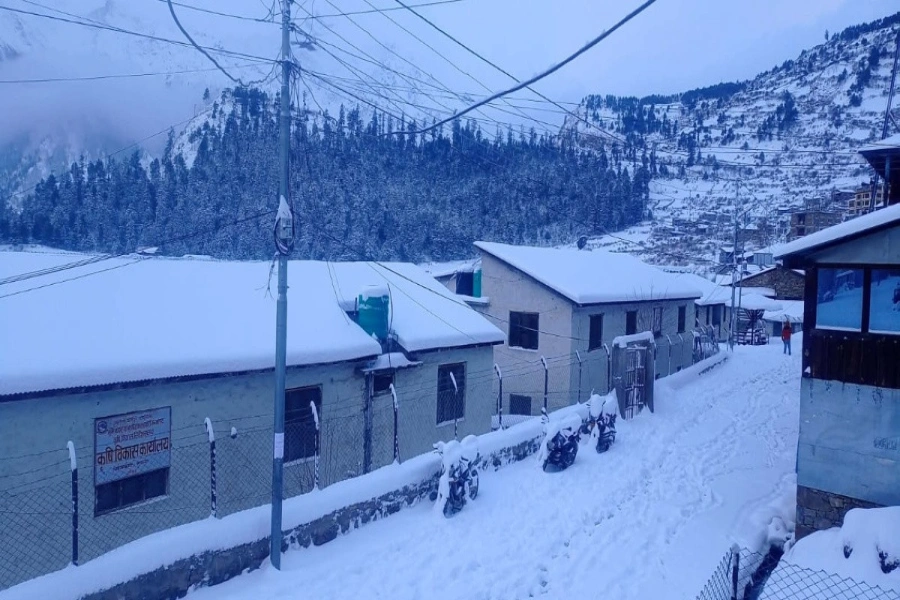It is a different confidence than those of power-suited businesswomen who sit in offices and constantly have phones glued to their ears.
The two women seem unfazed by all the noise and bustle around them, unaware of the half a dozen pairs of eyes watching us as chickens and goats come up to us clucking and bleating. [break]
They are relaxed, they are smiling, and they are happy. I have a vague idea where their new-found confidence and poise come from.
A lot of it can be put down to the fact that Rekha and Gita head a micro-finance group of ten women in their village of Baunepati in Sindhupalchowk district. The micro-finance program Rekha and Gita are involved in started five years ago as an initiative run by Dhulikhel Hospital’s department for community programs. Using Baunepati Health Centre as a base, the micro-finance scheme both women are involved in has changed their lives.
Five years ago, Gita fell ill and was taken to Dhulikhel Hospital. Her husband was out of work and with two small girls to feed, and Gita knew that every moment she spent in hospital and not in the fields meant she was losing even more money. That was when a staff member at the hospital met her for the first time with the idea behind a micro-finance program.

“The hospital asked me to organize a group of ten women, and said that they would provide the money for economic generation, health training, and knowledge of diseases in my village,” Gita said.
Elated, Gita recovered and went back to her village to tell her family about the opportunity which she had been given. As soon as she could, Gita gathered a group of nine other women, one of whom was Rekha, and told them the opportunity they had been offered.
“The hospital’s micro-finance program gave out 30,000 Rupees for 10 women. The women paid all the money back within three years, with no interests,” Gita says proudly.
Gita received Rs 3,000 from the department for community programs, which she used to buy a piglet. The piglet cost her Rs 1,500 and she put the rest of the money into feeding and rearing it. After six months, she was able to breed it with a neighbor’s pig, and after another few months, her sow gave birth to 12 piglets. Gita went on to sell these piglets for Rs 3,000 each, and she now has enough pigs for a small farm. With the money earned, her husband was able to train as a driver in India, and now both of them are working.
She smiles as she recalls her story in her quietly spoken manner.
“Before the micro-finance program, I didn’t have enough money in order to pay for my children’s education. I didn’t have enough money for food and even clothes. My girls are 12 and 10 now. The micro-finance program has changed their lives for good. They can tell the difference between the past and now.”
Gita is a shining example to her two girls, whom she brings up in conversation frequently. Quite obviously, they are her proudest achievement, and she tells about how she can also afford to give them money for snacks at school now.
As the program is attached to Baunepati Health Centre, another benefit of it is that the whole community learns about hygiene and healthcare through the women involved in the micro-finance scheme. Rekha is the officially nominated leader of this particular micro-finance group. More vocal and confident than Gita, she speaks animatedly about her role in the community.
“The micro-finance program benefits the whole village, not just the families of the women. For example, if people contract any diseases, they know that they have to go to hospital. The micro-finance program has helped raise awareness of what the hospital in Dhulikhel does. Some people come to the women’s homes to ask about ailments too. The women can then refer the patients to the health centre or the hospital. We also used to believe in traditional healers; now we encourage everyone to go to the hospital.”
By being associated with Dhulikhel Hospital, the ten women in the community have also garnered social status in their village, whereas before, they were known only for being the wives of their husbands. Whether or not the community realizes it, the women have managed to overturn a lifetime of tradition in a patriarchal society with their entrepreneurial skills and knowledge of healthcare.
“It’s beneficial for everyone,” Rekha gestures, as if to say what the women have done in the village is no big deal. “In the past, there were people, older people, who would bathe only once a month. Now people bathe at least twice a week. They are now more conscious of their health, hygiene, and sanitation which they know can contribute to disease control.”
And with that, both women stand up, dust themselves off, and see me out of the village. As we walk, people stop them and talk to them, gesticulating wildly at different body parts, or simply to say hello. Both women laugh and joke with the other villagers, in their quietly confident way.
Yes, these women may not realize it, but I do believe they have pioneered a new kind of feminism in one of the remotest places in the world where one would least expect it.
And that is the beauty of their strength.
Feminism is about treating everyone equally







































